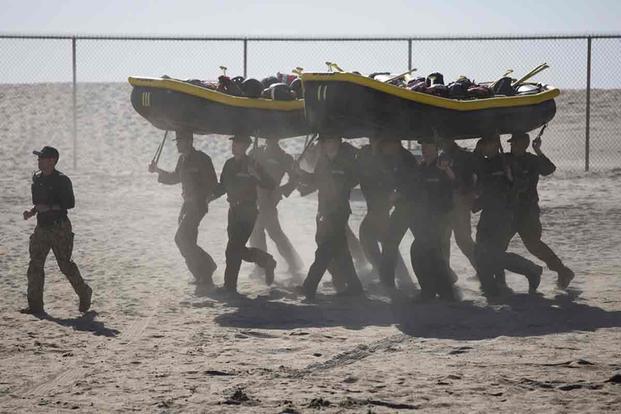The Navy SEAL training course is rife with overzealous and unchecked instructors, spotty medical care and students who were so determined to pass that they would either lie to doctors or turn to doping, according to a newly released and highly critical Navy report.
The report, commissioned in the wake of the death of Seaman Kyle Mullen, an aspiring SEAL who died in 2022 just after completing the course's notorious "Hell Week," details a "near perfect storm" of issues that included a "degree of complacency and insufficient attentiveness to a wide range of important inputs meant to keep the students safe."
The Navy ordered the investigation into how the training course, known as the Basic Underwater Demolition/SEAL course, or BUD/s, came in the wake of comments by Mullen's mother and New York Times reporting that exposed some of the problems detailed in the report.
Read Next: Army Secretary to Remind Commanders They Can't Deny Soldiers' Parental Leave
A spokesman for Naval Special Warfare Command told Military.com that the investigation is being reviewed, "however, it is too early to comment on any potential accountability actions at this time."
The report itself points to the need for some Navy accountability for the problems in SEAL training, and it notes that Naval Special Warfare Command intended to take action, though that section of the document is redacted.
A statement from the Navy released alongside the report said that "Naval Special Warfare Command has already implemented many improvements to its training programs and policies," and specifically cited greater instructor oversight and training as well as more thorough medical screenings for cardiac conditions.
In 2021, before Mullen and his fellow recruits of Class 352 began their training, leaders at Naval Special Warfare Command and the schoolhouse running BUD/s were already dealing with one problem on their hands. Candidates were dropping out at a far greater rate than normal.
While normally, about one in three candidates would drop during the first -- and toughest -- part of the training pipeline, between 2021 and 2022 that figure spiked to almost one in two.
Rear Adm. Hugh Howard, at the time the commander of Naval Special Warfare Command, told the leaders and instructors at the Basic Training Command, or BTC, the unit that runs BUD/s, that it was important to not relax standards to solve this issue.
"Zero is an okay number on the berm -- hold the standard," Howard is quoted as saying in the report.
However, investigators noted that some "may have misunderstood his intent." What followed instead was a change among the instructors to a mindset "focused on 'weeding out' candidates and 'hunting the back of the pack.'"
The report found that many of the instructors, who had no formal training for the role, "felt the quality of SEAL candidates making it through the pipeline had declined" and it was their job to uphold what they viewed as the standard.
Capt. Brad Geary, the officer in charge of BTC at the time, thought the increased drop rate had a few causes but he largely chalked it up to the fact that "the current generation had less mental toughness," the report said.
Meanwhile, the cadre of civilian instructors at the school, veteran SEALs put in place to be a check on the active-duty instructors, were sidelined after Geary made a deliberate decision to reduce their role in the training.
As a result, the investigation found that leaders at BTC ignored the civilian instructors' warnings about an incredibly tough curriculum and a "lack of perspective on the intent of the evolutions."
Compounding the problem was a medical team that was led by an officer -- unnamed in the report -- who, according to the report, "was inexperienced and ill-suited for leadership and yet was left responsible for ensuring the health of candidates at all BUD/s evolutions." Instead, two "overtasked" 1st class petty officers were overseeing medical care for all the SEAL candidates.
The lack of leadership and oversight in the medical department meant that no one at BTC or the overseeing Naval Special Warfare Center clinic had a full view of what treatment, problems or concerns any one candidate was facing, putting candidates at significant risk.
At the same time, recruits like Mullen were being overseen by wholly unqualified personnel.
Both this report as well as the Navy's investigation into Mullen's death noted that after the sailor finished Hell Week, he was given a cursory medical check and handed a flier that explicitly said "DO NOT go and see other/outside medical providers" before explaining, in all capital letters, that "if you go and see other medical personnel who do not understand Hell Week, they may admit you to the hospital or give you medicines that are not compatible with training."
As his condition worsened, the only people around him were other recruits who the Navy's investigators noted weren't even trained in CPR. Concerned by Mullen gasping for air as though he was "being drowned," sailors around him called the duty medical provider, who left them with the impression they should not go to the hospital, the report said.
According to the report, the very fact that sailors like Mullen would be hesitant to seek out medical help and downplay or hide issues in an effort to not be seen as weak was a challenge to the Navy's Special Warfare commands medical departments that "they were unprepared to meet."
That zeal to pass also meant that some recruits started turning to performance-enhancing drugs. The investigation revealed that the Navy has actually grappled with doping in the SEAL training pipeline at least twice in the past decade.
After both instances, one in 2011 and another in 2018, the Naval Special Warfare Command asked for permission to be able to test recruits for performance-enhancing substances more freely but was denied both times.
After Mullen's death, the investigators found a stash of performance-enhancing drugs in his car, including testosterone and human growth hormone. His blood and urine were unable to be tested for the drugs, the report noted.
Two candidates in Mullen's class ended up testing positive for performance-enhancing drugs ,and 20 other candidates are in limbo while the Navy gathers more evidence, according to the investigation.
For the time being, leaders at Naval Special Warfare Command are relying on tests that can suggest but not definitively prove use of performance-enhancing substances. But the report notes that "without a rigorous testing program producing timely results," the Navy "will be unable to effectively deter use."
In the wake of Mullen's death, the Navy has offered some accountability for the failures and oversights that have been exposed.
In October, the Navy issued administrative "non-punitive" letters to Geary and an unnamed senior medical officer. Geary's boss, Capt. Brian Drechsler, the commodore of the Naval Special Warfare Center, also received a letter.
While the letters themselves carry no punishment, they typically render an officer unpromotable.
Drechsler would go on to leave his post early in May. A spokesman for Naval Special Warfare command said at the time that the change was made in part "to better focus on addressing some of the lingering issues identified" by this very report.
Geary would be replaced by Capt. Timothy Sulick in June 2022, according to the report. The Navy does not appear to have publicly announced this turnover or said whether it occurred ahead of schedule.
According to the report, Sulick "emphasizes with instructors that their role is to raise the candidates up to the standards, not drive them to quit."
-- Konstantin Toropin can be reached at konstantin.toropin@military.com. Follow him on Twitter @ktoropin.
Related: 'Instructed Not To Call 911': Report Reveals Confusion, Failure and Fear in SEAL Candidate Death













